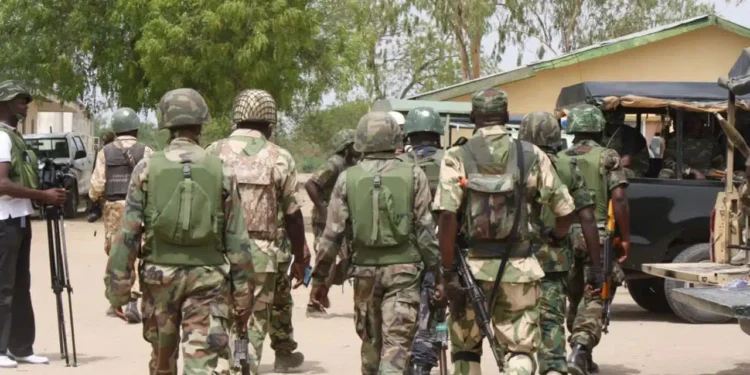The Nigerian Military has refuted viral claims about property demolitions while revealing successful operations against drug trafficking networks operating near the Jaji Military Cantonment in Kaduna State.
During a guided press tour on Sunday, Captain Olusegun Abidoye, Acting Deputy Director of Army Public Relations at the Infantry Corps Centre, categorically denied reports circulating on social media platforms alleging that the military had demolished civilian properties within its jurisdiction.
“No demolition exercise has been carried out by the Jaji Cantonment. The reports circulating on some online media platforms are completely untrue,” Abidoye stated, describing the claims as deliberate attempts to damage the Nigerian Army’s reputation.
The military spokesman clarified that the disputed land remains subject to ongoing court proceedings, with the cantonment strictly adhering to judicial orders to maintain the status quo. He accused the opposing parties in the litigation of violating court directives by constructing new buildings and allowing construction companies to excavate laterite from the disputed area.
In response to these violations, the cantonment has filed for an interlocutory injunction to prevent further excavation activities until the court case reaches resolution.
However, the military confirmed significant success in dismantling organized drug trafficking operations in communities surrounding the cantonment. The anti-narcotics operations targeted several settlements including Railway Settlement, Unguwan Loya, Unguwan Aboki, Unguwan Alhaji, and Unguwan Alasan.
Captain Abidoye revealed that military intelligence and field surveillance uncovered extensive drug trafficking networks involving more than 15 suspects. The operations resulted in multiple arrests, with apprehended individuals subsequently transferred to the National Drug Law Enforcement Agency for prosecution.
The seized narcotics included a wide range of illegal substances such as Indian hemp, skunk, Exol, ice (crystal methamphetamine), crack cocaine, tramadol, and various psychotropic drugs. The military expressed particular concern about the impact of drug abuse on children from both military and civilian families within the cantonment area.
To address mounting security challenges, the cantonment has relocated informal businesses operating in the surrounding communities into a centralized market facility, enabling better monitoring and control of commercial activities.
The military also dismissed allegations that it had disconnected electricity supply to neighboring civilian communities, stating that the army played no role in power supply issues affecting the area.
Captain Abidoye highlighted ongoing safety concerns posed by civilian settlements that overlap with military training grounds, noting that residents’ refusal to relocate creates dangerous situations during field exercises involving live ammunition.
The Jaji Military Cantonment serves as a crucial training and operational hub for Nigeria’s armed forces, housing multiple institutions including the Armed Forces Command and Staff College, Infantry Corps Centre, Martin Luther Agwai International Leadership and Peacekeeping Centre, Warrant Officers’ Academy, Nigerian Army School of Infantry, 4 Demonstration Battalion, and 601 Aviation Battalion.
Reaffirming the cantonment’s security mandate, Abidoye declared that while the military remains committed to protecting law-abiding citizens in and around the facility, it would not tolerate criminal activities disguised as legitimate residency.



















